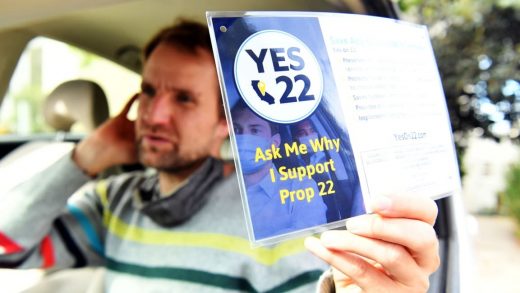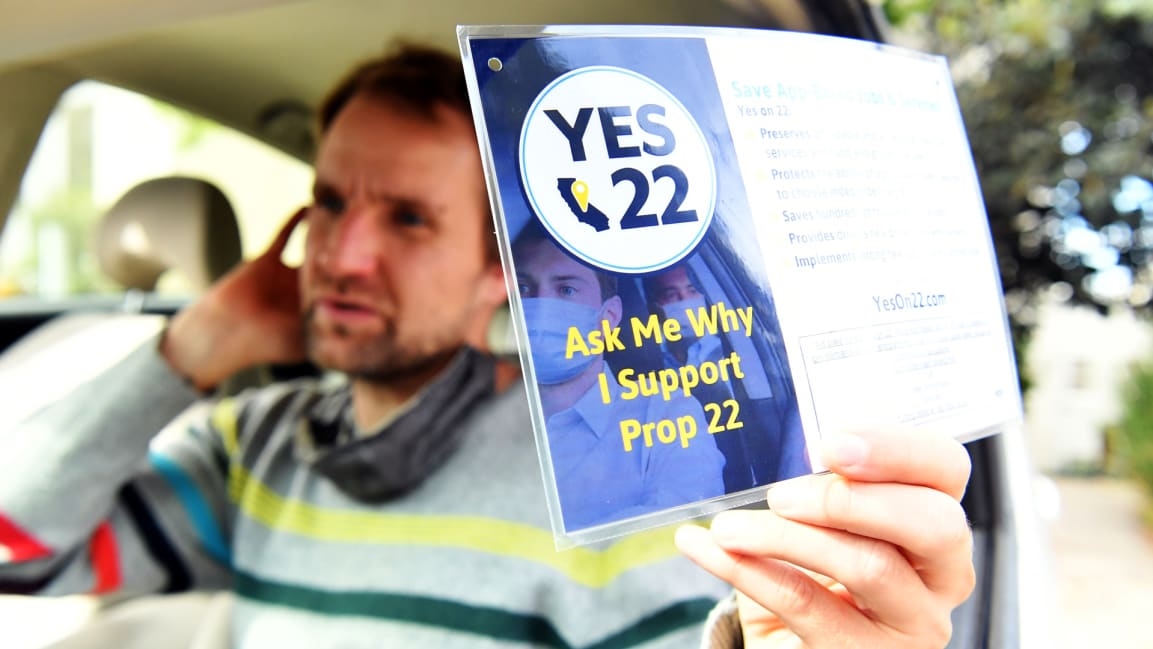California’s vote to keep Uber drivers as contractors is a blow to the labor movement
Last night, Californians decided that gig economy workers, such as Uber drivers and Postmates deliverers, should be classified as contractors, not employees. It was a tough blow to labor rights groups who have been fighting to get gig workers who work more than 30 hours a week employee benefits such as healthcare and paid time off. Optimists will say Prop 22 still has room to provide some benefits to a lot more workers, even if they’re not full employees.
“I would say that this is a good development because for a long time, we have needed some sort of legislative framework to fund benefits for people who are not full-time employees,” says Arun Sundararajan, professor at New York University’s Stern business school, who has written about the gig economy.
Prop 22 paves a new way for companies to offer benefits to gig workers. The rule introduces a wage floor and requires companies to contribute subsidies for health benefits, occupational accident insurance, vehicle expenses, and accidental death insurance. Those in favor of Prop 22 say that the rule will allow more drivers to have access to health subsidies and insurance (though drivers would have to work at least 25 hours a week to qualify). In contrast, if Prop 22 hadn’t passed, Uber would only be able to afford to hire a small portion of its current drivers. Proponents say that would cut off easy access to employment amid a recession for many recently unemployed workers.
However, labor rights activists say that Prop 22 doesn’t go far enough to ensure workers are getting sufficient earnings or support for the work they do. For example, Prop 22 only offers very limited workers’ compensation and disability coverage. During the pandemic, Uber offered drivers who contracted COVID-19 two weeks of paid leave. Such assistance does little for workers who are out longer than two weeks or who have died. Contractor status also leaves families of drivers will little recourse in the case of death. When the Los Angeles family of a driver who worked 80 hours a week and died of COVID-19 tried to get death benefits, they were rebuffed, according to the Los Angeles Times.
Even with Prop 22’s passage, the fight for platform-based contract labor rights is far from over. At the heart of the controversy around the proposition is a larger dilemma for Americans to debate: Is it more important to compensate workers fairly, or to provide cheap, competitive services? If Prop 22 is any indication, labor is losing.
The threat of AB5
A California law passed last year called AB5 would have forced gig companies to hire workers full-time and offer them benefits—a very serious threat to gig companies’ operating model and eventual profitability. To avoid adhering to the law, the companies have spent the last year litigating the decision and campaigning for their alternative proposition.
These companies don’t want to employ drivers in part because it’s expensive. Neither Uber nor Lyft, both of which are public companies, are profitable. Uber lost $8.5 billion in 2019. Lyft lost $2.6 billion for the same time period. The pandemic has further squeezed both companies, and earlier this year they threatened to pull out of California if Prop 22 didn’t pass.
Gig economy companies spent an enormous $200 million to ingratiate themselves with voters. In addition to spending an exorbitant amount of money on campaigning, Uber also made extensive use of its app, which has been serving up positive messages about Prop 22 since August. The campaign seemed to work.
Polling from the industry site The Rideshare Guy suggests that many drivers were supportive of Prop 22. However, gig workers make up a small portion of California’s voting populace. Where delivery companies succeeded most was in bending public opinion to support their vision. Many Californians were probably not keen on losing the ability to hail a car with the tap of a button. Already, the proposition is paying off. Uber’s share price has shot up 13% since the proposition passed.
Billionaire corps just hijacked the ballot measure system in CA by spending millions to mislead voters. The most expensive ballot measure in U.S. history, is a loss for our democracy that could open the door to other attempts by corps to write their own laws.
1/X
— Gig Workers Are Voting No On Prop 22 (@GigWorkersRise) November 4, 2020
While labor groups will continue to battle for contract worker rights in California and other parts of the country, the proposition’s passage does not bode well for future decisions in other states. Uber and Lyft are currently embroiled in a lawsuit in Massachusetts over worker classification. This decision could create a framework for Uber and Lyft as they negotiate with regulators.
How should drivers be compensated?
At the heart of this discord over workers’ rights is a debate about American values. Do we value cheap services? Or do we value good-paying jobs?
“We went through a set of changes in beliefs in the early ’80s, both the U.K. and the U.S. with Thatcher and Reagan, and we put the country on a course that will—without government intervention—steadily increase the power of capital and reduce the power of labor,” says Sundararajan.
America relies on employers to fund key elements of the social safety net, such as healthcare and paid leave. Workers have few options for getting sufficient wages, healthcare, and other insurances other than full-time employment. For a long time, unions have helped secure those entitlements for workers. But the power of labor and unions has been eroding for decades.
Gig workers have tried to unionize, to varying effect. In New York City, the Independent Driver’s Guild was able to create a wage floor for drivers in 2018. But trying to turn drivers into employees has been a much harder battle. Several different workers groups backed opposition to Prop 22, though it did not prove to be enough to win over Californians.
Sundararajan says the only way to fix this imbalance of power is through legislation that supports workers’ rights. “The only real solution here is a much deeper structural change to our system,” he says. This would have to include legislation that prevents companies from seeking contract workers overseas and giving laborers and unions more agency at the bargaining table. By contrast, he does think something like Prop 22 is a starting point for developing a safety net and access to some benefits for people without full-time employment.
But this perspective suggests that Uber and Lyft’s gig economy model, which requires random drivers to be on call, is the only one out there. It ignores the alternative gig companies that are trying to create companies that are good for workers. Juno, a driver-friendly New York City app, once hoped to share earnings with workers before getting killed off in competition with Uber and Lyft. Other local competitors in cities around the country have met a similar fate. While many ride-sharing services that dared to compete with Uber and Lyft have gone under trying to compete, some alternatives have survived and even thrived. Austin has a rideshare nonprofit that provides a ride-hailing app to local drivers. Perhaps the most interesting entrant in this space is the Dallas-based company Alto. The company is more like Uber Select in its pricing, but it employs drivers like a limousine service and plans on being profitable.
What has kept these companies from thriving is often lobbying efforts from Uber and Lyft. Several cities have tried to ban Uber since it first emerged in 2011. Each time, Uber has fought back, using incredible amounts of capital and legal resources to bring these cities to heel. Prop 22 is no different.
(9)



